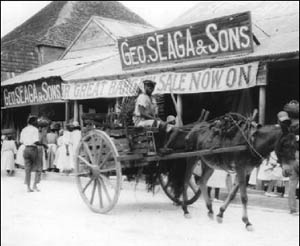
It is well known that, at the turn of the last century, thousands of Syrians/Lebanese made the trip across the Atlantic to New York. What is less well known, at least here in the US, is that many Syrian emigrants went to other parts of the New World, including South America, Mexico, and the Caribbean. A lot of these travelers found their way to Jamaica, which, to this day, has a sizeable Syrian contingent.
Unlike the Syrians in the US, however, these Syro-Jamaicans didn’t obtain a permanent Orthodox priest, or establish a functioning Orthodox community. They stuck together as an ethnic group, but in terms of their religion, they eventually became absorbed into the existing Anglican church of Jamaica.
That said, the Syro-Jamaicans did receive occasional pastoral visits from Orthodox clergy. In 1913-14, Fr. Raphael Morgan, the first black Orthodox priest in America (who was serving under the Church of Greece at the time), visited Jamaica and served the Divine Liturgy (aboard a Russian ship) for the Syrians he met. But he wasn’t the first Orthodox clergyman to visit Jamaica. Three years earlier, in August of 1910, a priest named Fr. Antonio Michael came to the island. Here is an account of his visit, from the Kingston Gleaner (8/4/1910):
It will be remembered that during last year the [Anglican] Archbishop addressed a meeting of Syrians on the Rectory Lawn. Since that time many of the Syrians have been worshiping with us regularly. A step towards closer fellowship was taken on July 17th, when the Rector, taking advantage of the visit to Jamaica of a priest of the Greek Orthodox Church, arranged a special service for Syrians. The priest in question, Father Antonio Michael came with authority from the Patriarch of Antioch to visit the Syrians scattered through these Islands.
Having inspected the Patriarch’s letter the Rector invited Father Antonio to celebrate the Holy Eucharist at the Altar of the Kingston Parish Church. The invitation was accepted and accordingly on Sunday we were privileged to witness a fine illustration of the friendly relations which exist between the Anglican and the Greek Orthodox Church.
At 8 a.m. the Rector celebrated and Father Antonio sat in the Sanctuary in his robes. At 9 a.m. Father Antonio celebrated for the Syrians in the presence of a large congregation of Jamaicans, following the Eastern rite, the Rector being present within the Sanctuary. The services lasted altogether two hours and a half, but many remained to the end, though the Syrians’ service being in Arabic was difficult to follow for those not acquainted with the language. To those who knew something of the Eastern rite it was full of interest. At the close of the service Father Antonio commended the Syrians to the pastoral care of the Rector.
Father Antonio concluded his address on the Gospel for the day in these words:
“May you live together in peace and love. I raise my heart and hands to God Almighty asking Him to be with every one of you. May He prosper you in all your undertakings. May He bless the Island of Jamaica and grant to His Majesty King George V. strength, wisdom and length of days; to His Excellency the Governor and to all associated with him in the Government of this Island, knowledge and understanding. I pray that our Heavenly Father may keep and bless the Archbishop and the Ministers of the Holy Church especially Mr. Ripley who has allowed me to have this service to-day. O God, guard Thy children from all dangers ghostly [spiritually] and bodily. May they grow in grace and in the knowledge of our Lord Jesus Christ and finally of His great mercy obtain everlasting life. Amen.”
Clearly, Fr. Antonio did not plan to remain in Jamaica, and he saw nothing wrong with commending the Orthodox people there to the care of the Anglican clergy. As I said, the next Orthodox priest (that I’m aware of) to visit Jamaica was Fr. Raphael Morgan. While he was under the Church of Greece, most of the other Orthodox clergymen to visit Jamaica in the early 20th century were Antiochians. However, no permanent priest was ever assigned to for the Syrian community, and today, the descendants of those Syrians are predominantly Anglican.